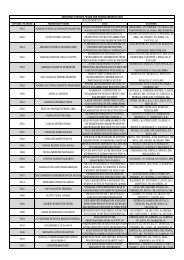immunology of infectious and parasitic diseases - XXXVII Congress ...
immunology of infectious and parasitic diseases - XXXVII Congress ...
immunology of infectious and parasitic diseases - XXXVII Congress ...
You also want an ePaper? Increase the reach of your titles
YUMPU automatically turns print PDFs into web optimized ePapers that Google loves.
PI3K CONFERS RESISTENCE AGAINST Trypanosoma cruzi INFECTION<br />
DUE TO ITS IMPORTANT ROLE IN LYMPHOCYTE PROLIFERATION AND<br />
MICROBICIDAL ACTIVITY OF MACROPHAGES<br />
MARIA CLÁUDIA DA SILVA (1) ; RENATA SESTI (1) ; FABRÍCIO C. DIAS (1) ;<br />
GRACE K. SILVA (1) ; TIAGO DA SILVA MEDINA (1) ; FERNANDO Q. CUNHA (1) ;<br />
JOÃO SANTANA DA SILVA (1) ; THIAGO MATTAR CUNHA (1)<br />
(1) School <strong>of</strong> Medicine <strong>of</strong> Ribeirão Preto, University <strong>of</strong> São Paulo (USP),<br />
Ribeirão Preto, São Paulo - Brazil.<br />
Background <strong>and</strong> objective: The phosphatidylinositol-3-kinases (PI3Ks) are a<br />
family <strong>of</strong> lipid kinases that plays a crucial role in several cellular processes<br />
including survival <strong>and</strong> proliferation. Among PI3Ks, PI3K is a member activated<br />
by G protein coupled receptors, involved in the signaling <strong>of</strong> chemotactic factors<br />
<strong>and</strong> leukocytes migration <strong>and</strong> activation. In this study, we evaluated the role <strong>of</strong><br />
PI3K during experimental infection by T. cruzi. Methods: C57BL/6 WT <strong>and</strong><br />
PI3K -/- mice were infected with 10 3 forms <strong>of</strong> T. cruzi Y strain. Ten days after<br />
infection, the heart tissue was harvested for quantification <strong>of</strong> PI3K activation.<br />
For evaluation <strong>of</strong> PI3K role eighteen days after T. cruzi infection, heart tissue<br />
was harvested for assessment <strong>of</strong> inflammation, lesion <strong>and</strong> parasitism, <strong>and</strong> we<br />
observed daily the parasitemia <strong>and</strong> survival rate <strong>of</strong> WT <strong>and</strong> PI3K -/- mice. The<br />
involvement <strong>of</strong> PI3K in the killing <strong>of</strong> the parasite <strong>and</strong> NO production was<br />
assessed in bone marrow-derived macrophages from WT <strong>and</strong> PI3K -/- mice. To<br />
verify whether PI3K signaling influenced the in vitro T cell proliferation,<br />
splenocytes stained with CFSE from both groups were stimulated with ConA<br />
<strong>and</strong> α-CD3 during 72 hours. Results: T. cruzi infection causes an increase in<br />
the PI3K activation in the heart tissue. Although there is no difference in the<br />
parasitemia between WT <strong>and</strong> PI3K -/- mice in all times evaluated, all PI3K<br />
deficient mice died until day 25 after infection, whereas WT mice remained alive<br />
after 35 days. PI3K -/- mice also showed greater inflammation, parasitism <strong>and</strong><br />
lesion in the heart tissue. Interestingly, in the absence <strong>of</strong> PI3K, the heart tissue<br />
express five times higher levels <strong>of</strong> iNOS enzyme after infection compared with<br />
WT mice, but the expression <strong>of</strong> arginase I (ARG1), that also consume the<br />
amino acid arginine thus impairing the NO production, is twenty times higher<br />
compared with WT mice. In vitro, macrophages from PI3K -/- mice, when<br />
stimulated with IFN, fail to produce NO <strong>and</strong> to kill the parasite. Corroborating<br />
these data, the addition <strong>of</strong> ARG1 inhibitor reverts the fail in NO production by<br />
PI3K -/- macrophages. Finally, PI3K signaling seems to be involved in the<br />
adaptive response, augmenting T cell proliferation. Conclusion: These results<br />
indicate that PI3K is critical for the host to control T. cruzi parasitism. In the<br />
heart tissue <strong>of</strong> the infected mice, PI3K is involved in the microbicidal<br />
mechanisms <strong>of</strong> macrophage by mediation <strong>of</strong> NO production.



